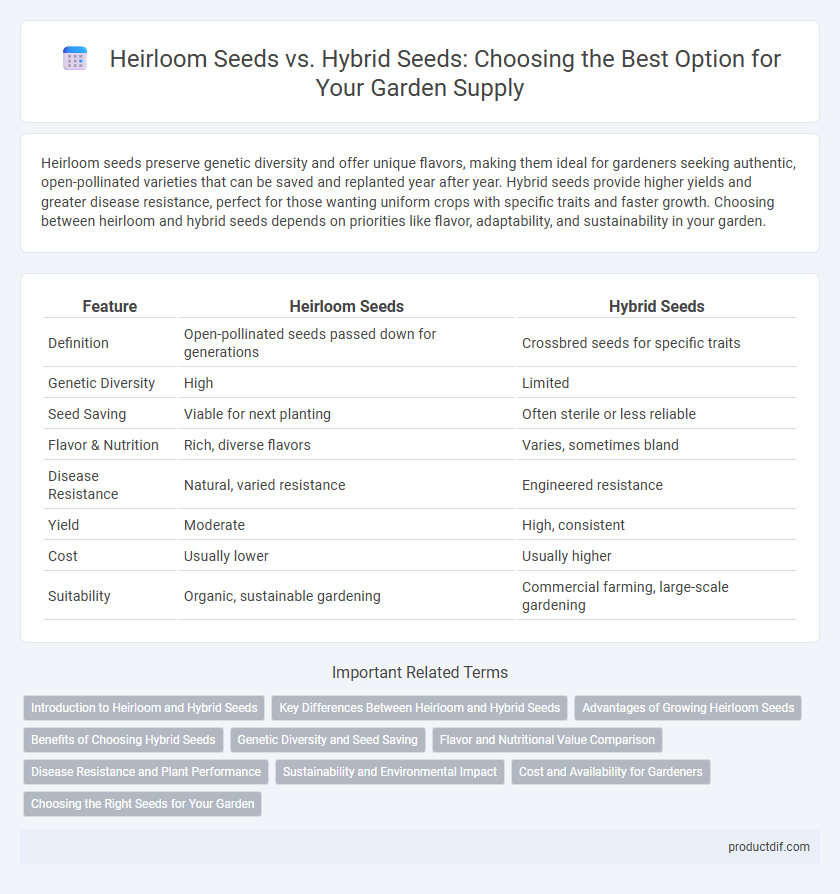Heirloom seeds preserve genetic diversity and offer unique flavors, making them ideal for gardeners seeking authentic, open-pollinated varieties that can be saved and replanted year after year. Hybrid seeds provide higher yields and greater disease resistance, perfect for those wanting uniform crops with specific traits and faster growth. Choosing between heirloom and hybrid seeds depends on priorities like flavor, adaptability, and sustainability in your garden.
Table of Comparison
| Feature | Heirloom Seeds | Hybrid Seeds |
|---|---|---|
| Definition | Open-pollinated seeds passed down for generations | Crossbred seeds for specific traits |
| Genetic Diversity | High | Limited |
| Seed Saving | Viable for next planting | Often sterile or less reliable |
| Flavor & Nutrition | Rich, diverse flavors | Varies, sometimes bland |
| Disease Resistance | Natural, varied resistance | Engineered resistance |
| Yield | Moderate | High, consistent |
| Cost | Usually lower | Usually higher |
| Suitability | Organic, sustainable gardening | Commercial farming, large-scale gardening |
Introduction to Heirloom and Hybrid Seeds
Heirloom seeds are open-pollinated varieties passed down through generations, prized for their genetic diversity, unique flavors, and adaptability to local environments. Hybrid seeds are created by cross-breeding two distinct parent plants to produce offspring with specific traits such as increased yield, disease resistance, and uniformity. Gardeners often choose heirloom seeds for preserving heritage and flavor, while hybrids are preferred for consistent performance and productivity.
Key Differences Between Heirloom and Hybrid Seeds
Heirloom seeds are open-pollinated varieties that preserve genetic traits from past generations, ensuring seed-saving and true-to-type plants, while hybrid seeds result from crossbreeding two different parent plants to enhance specific traits like disease resistance and yield. Heirloom seeds often offer greater biodiversity and unique flavors, whereas hybrid seeds provide uniformity and vigor but typically do not produce reliable seeds for future planting. Gardeners choose heirloom seeds for heritage preservation and hybrid seeds for consistent performance under varied growing conditions.
Advantages of Growing Heirloom Seeds
Heirloom seeds offer superior genetic diversity, ensuring plants with unique flavors, textures, and increased resilience to local pests and diseases compared to hybrid seeds. These seeds preserve traditional plant varieties, enabling gardeners to save and replant seeds year after year, which supports sustainable gardening practices. Growing heirloom seeds also contributes to biodiversity conservation and cultural heritage by maintaining rare and historic plant strains.
Benefits of Choosing Hybrid Seeds
Hybrid seeds offer increased vigor and higher yields due to selective crossbreeding, making them ideal for gardeners seeking robust plant performance. These seeds provide enhanced disease resistance and uniformity in fruit size and quality, ensuring a consistent harvest. Gardeners benefit from improved adaptability to varying environmental conditions, which reduces crop failure risks and boosts overall productivity.
Genetic Diversity and Seed Saving
Heirloom seeds preserve genetic diversity by maintaining open-pollinated varieties passed down through generations, allowing gardeners to save seeds that remain true to type. Hybrid seeds result from controlled crosses between distinct parent plants, often sacrificing genetic diversity for traits like uniformity and disease resistance, making saved seeds less reliable. Saving heirloom seeds supports biodiversity and local adaptation, while relying on hybrids requires purchasing new seeds each season.
Flavor and Nutritional Value Comparison
Heirloom seeds offer superior flavor profiles and richer nutritional content compared to hybrid seeds, which are often bred for yield and disease resistance rather than taste. Studies show heirloom varieties contain higher levels of antioxidants, vitamins, and minerals, enhancing both health benefits and culinary quality. Gardeners seeking flavorful and nutrient-dense produce prioritize heirloom seeds over their hybrid counterparts for home cultivation.
Disease Resistance and Plant Performance
Heirloom seeds, prized for their genetic diversity, often lack the enhanced disease resistance found in hybrid seeds, which are bred specifically to combat common plant pathogens. Hybrid seeds typically offer superior plant performance, including higher yields and uniform growth, due to their controlled crossbreeding techniques. Selecting between heirloom and hybrid seeds depends on the gardener's priorities for disease resistance versus preserving genetic heritage.
Sustainability and Environmental Impact
Heirloom seeds promote sustainability by preserving genetic diversity and enabling seed saving, reducing dependency on commercial seed suppliers and minimizing waste. Hybrid seeds often require more resources such as water, fertilizers, and pesticides, which can contribute to environmental degradation and soil depletion. Choosing heirloom varieties supports eco-friendly gardening practices by fostering resilient ecosystems and reducing chemical inputs.
Cost and Availability for Gardeners
Heirloom seeds typically cost more than hybrid seeds due to their rare genetics and limited production, appealing to gardeners seeking unique plant varieties. Hybrid seeds are generally more affordable and widely available in garden centers and online retailers, making them a cost-effective choice for large-scale or beginner gardeners. Availability of heirloom seeds depends on specialty seed banks and local seed exchanges, whereas hybrid seeds benefit from mass commercial production ensuring consistent supply.
Choosing the Right Seeds for Your Garden
Heirloom seeds offer genetic diversity and preserve traditional flavors, making them ideal for gardeners prioritizing unique plant varieties and seed saving. Hybrid seeds provide higher yields and increased disease resistance, suitable for those seeking reliable, uniform crops in variable growing conditions. Selecting between heirloom and hybrid seeds depends on your garden goals, climate adaptability, and commitment to seed saving practices.
Heirloom seeds vs Hybrid seeds Infographic

 productdif.com
productdif.com